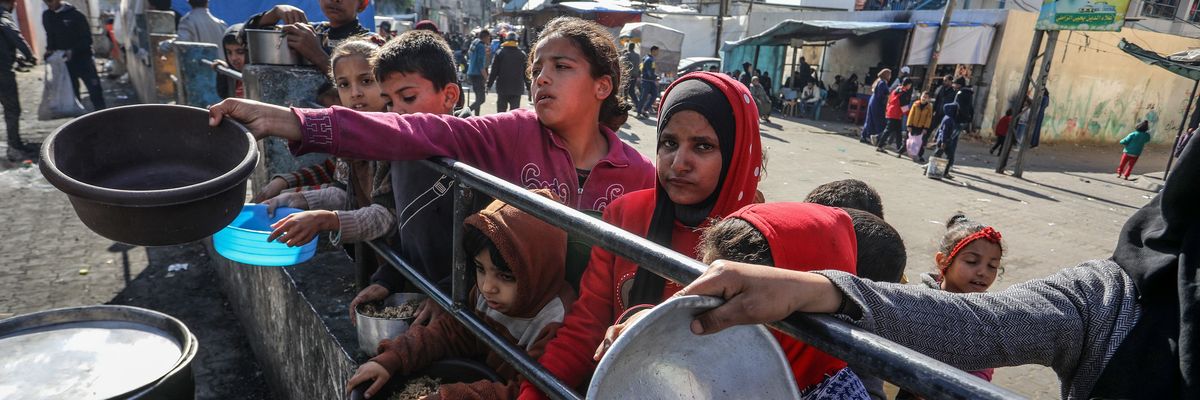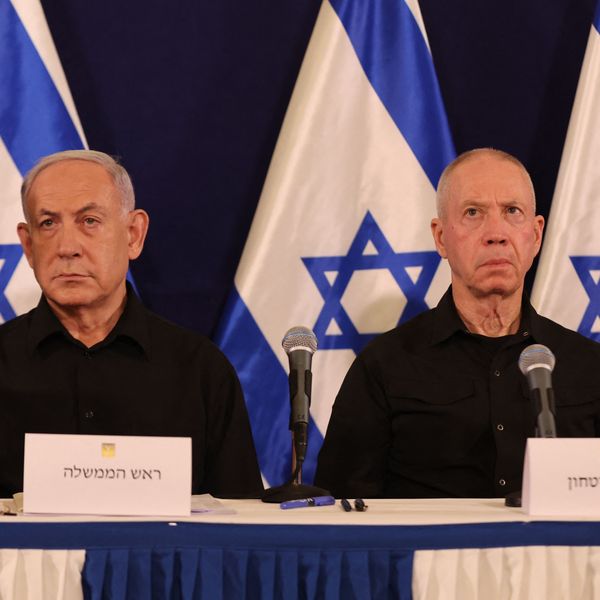
Children wait in line to receive food prepared by volunteers in Rafah, Gaza on February 9, 2024.
Israeli Groups Slam Netanyahu Government for Flouting ICJ Ruling
"We condemn the fact that Israel has so far failed to change its behavior."
A dozen Israeli human rights organizations have backed an open letter condemning their country's government for continuing to obstruct the delivery of humanitarian aid to Gaza, despite the legally binding order issued in late January by the United Nations' highest court.
The International Court of Justice's (ICJ) interim decision states that Israel is plausibly committing genocide in the Gaza Strip and instructs the country's military to ensure the delivery of aid to Gaza's population, most of which is under growing threat of starvation and disease.
"The ICJ order is a legal obligation to end the humanitarian catastrophe in Gaza," reads the Israeli groups' letter, which was first reported by The Guardian on Monday. "It must be abided by, not only to ease the urgent suffering of civilians but for the sake of humanity as a whole."
Both the Israeli government and ordinary Israelis have blocked food and other desperately needed aid from entering Gaza in recent months, intensifying what's been described as one of the worst humanitarian emergencies in modern history.
The World Food Program said last week that there's enough food sitting just outside Gaza to feed the territory's entire population as children inside the territory starve to death.
"Israeli conduct has consistently and groundlessly impeded aid operations within Gaza."
In their new letter, Breaking the Silence, the Association for Civil Rights in Israel, and other Israeli human rights groups "condemn the fact that Israel has so far failed to change its behavior based on the measures imposed by the ICJ, as well as the fact that humanitarian aid to Gaza dropped by 50% in the month following the ruling."
"We call for an immediate cease-fire, which must include the return of the hostages. We urge the Israeli government to comply with the ICJ order and implement the court's provisional measures, which are essential to mitigating and overcoming the humanitarian catastrophe in Gaza," the groups wrote. "Moreover, we call on the international community to use its collective influence to promote and support an immediate cease-fire and the implementation of the provisional measures, and to increase its efforts to ensure that the Israeli hostages are returned from Gaza."
Israel reportedly provided a mandatory self-assessment on its compliance with the ICJ ruling to the court late last month, but the report has not been made public. Amnesty International and Human Rights Watch issued separate statements on February 26 accusing the Israeli government of defying the ICJ order by systematically impeding the delivery of humanitarian aid.
In a report released last week, Refugees International noted that "despite its claims to be facilitating humanitarian aid," evidence on the ground "shows that Israeli conduct has consistently and groundlessly impeded aid operations within Gaza, blocked legitimate relief operations, and resisted implementing measures that would genuinely enhance the flow of humanitarian aid into Gaza."
"Israeli authorities have consistently failed to take effective action to improve aid delivery," the report states. "Even with high-level interventions by U.S. and U.N. officials, this refusal reflects an unwillingness to facilitate aid delivery, echoing historical precedents of aid denials in Gaza."
An Urgent Message From Our Co-Founder
Dear Common Dreams reader, The U.S. is on a fast track to authoritarianism like nothing I've ever seen. Meanwhile, corporate news outlets are utterly capitulating to Trump, twisting their coverage to avoid drawing his ire while lining up to stuff cash in his pockets. That's why I believe that Common Dreams is doing the best and most consequential reporting that we've ever done. Our small but mighty team is a progressive reporting powerhouse, covering the news every day that the corporate media never will. Our mission has always been simple: To inform. To inspire. And to ignite change for the common good. Now here's the key piece that I want all our readers to understand: None of this would be possible without your financial support. That's not just some fundraising cliche. It's the absolute and literal truth. We don't accept corporate advertising and never will. We don't have a paywall because we don't think people should be blocked from critical news based on their ability to pay. Everything we do is funded by the donations of readers like you. Will you donate now to help power the nonprofit, independent reporting of Common Dreams? Thank you for being a vital member of our community. Together, we can keep independent journalism alive when it’s needed most. - Craig Brown, Co-founder |
A dozen Israeli human rights organizations have backed an open letter condemning their country's government for continuing to obstruct the delivery of humanitarian aid to Gaza, despite the legally binding order issued in late January by the United Nations' highest court.
The International Court of Justice's (ICJ) interim decision states that Israel is plausibly committing genocide in the Gaza Strip and instructs the country's military to ensure the delivery of aid to Gaza's population, most of which is under growing threat of starvation and disease.
"The ICJ order is a legal obligation to end the humanitarian catastrophe in Gaza," reads the Israeli groups' letter, which was first reported by The Guardian on Monday. "It must be abided by, not only to ease the urgent suffering of civilians but for the sake of humanity as a whole."
Both the Israeli government and ordinary Israelis have blocked food and other desperately needed aid from entering Gaza in recent months, intensifying what's been described as one of the worst humanitarian emergencies in modern history.
The World Food Program said last week that there's enough food sitting just outside Gaza to feed the territory's entire population as children inside the territory starve to death.
"Israeli conduct has consistently and groundlessly impeded aid operations within Gaza."
In their new letter, Breaking the Silence, the Association for Civil Rights in Israel, and other Israeli human rights groups "condemn the fact that Israel has so far failed to change its behavior based on the measures imposed by the ICJ, as well as the fact that humanitarian aid to Gaza dropped by 50% in the month following the ruling."
"We call for an immediate cease-fire, which must include the return of the hostages. We urge the Israeli government to comply with the ICJ order and implement the court's provisional measures, which are essential to mitigating and overcoming the humanitarian catastrophe in Gaza," the groups wrote. "Moreover, we call on the international community to use its collective influence to promote and support an immediate cease-fire and the implementation of the provisional measures, and to increase its efforts to ensure that the Israeli hostages are returned from Gaza."
Israel reportedly provided a mandatory self-assessment on its compliance with the ICJ ruling to the court late last month, but the report has not been made public. Amnesty International and Human Rights Watch issued separate statements on February 26 accusing the Israeli government of defying the ICJ order by systematically impeding the delivery of humanitarian aid.
In a report released last week, Refugees International noted that "despite its claims to be facilitating humanitarian aid," evidence on the ground "shows that Israeli conduct has consistently and groundlessly impeded aid operations within Gaza, blocked legitimate relief operations, and resisted implementing measures that would genuinely enhance the flow of humanitarian aid into Gaza."
"Israeli authorities have consistently failed to take effective action to improve aid delivery," the report states. "Even with high-level interventions by U.S. and U.N. officials, this refusal reflects an unwillingness to facilitate aid delivery, echoing historical precedents of aid denials in Gaza."
A dozen Israeli human rights organizations have backed an open letter condemning their country's government for continuing to obstruct the delivery of humanitarian aid to Gaza, despite the legally binding order issued in late January by the United Nations' highest court.
The International Court of Justice's (ICJ) interim decision states that Israel is plausibly committing genocide in the Gaza Strip and instructs the country's military to ensure the delivery of aid to Gaza's population, most of which is under growing threat of starvation and disease.
"The ICJ order is a legal obligation to end the humanitarian catastrophe in Gaza," reads the Israeli groups' letter, which was first reported by The Guardian on Monday. "It must be abided by, not only to ease the urgent suffering of civilians but for the sake of humanity as a whole."
Both the Israeli government and ordinary Israelis have blocked food and other desperately needed aid from entering Gaza in recent months, intensifying what's been described as one of the worst humanitarian emergencies in modern history.
The World Food Program said last week that there's enough food sitting just outside Gaza to feed the territory's entire population as children inside the territory starve to death.
"Israeli conduct has consistently and groundlessly impeded aid operations within Gaza."
In their new letter, Breaking the Silence, the Association for Civil Rights in Israel, and other Israeli human rights groups "condemn the fact that Israel has so far failed to change its behavior based on the measures imposed by the ICJ, as well as the fact that humanitarian aid to Gaza dropped by 50% in the month following the ruling."
"We call for an immediate cease-fire, which must include the return of the hostages. We urge the Israeli government to comply with the ICJ order and implement the court's provisional measures, which are essential to mitigating and overcoming the humanitarian catastrophe in Gaza," the groups wrote. "Moreover, we call on the international community to use its collective influence to promote and support an immediate cease-fire and the implementation of the provisional measures, and to increase its efforts to ensure that the Israeli hostages are returned from Gaza."
Israel reportedly provided a mandatory self-assessment on its compliance with the ICJ ruling to the court late last month, but the report has not been made public. Amnesty International and Human Rights Watch issued separate statements on February 26 accusing the Israeli government of defying the ICJ order by systematically impeding the delivery of humanitarian aid.
In a report released last week, Refugees International noted that "despite its claims to be facilitating humanitarian aid," evidence on the ground "shows that Israeli conduct has consistently and groundlessly impeded aid operations within Gaza, blocked legitimate relief operations, and resisted implementing measures that would genuinely enhance the flow of humanitarian aid into Gaza."
"Israeli authorities have consistently failed to take effective action to improve aid delivery," the report states. "Even with high-level interventions by U.S. and U.N. officials, this refusal reflects an unwillingness to facilitate aid delivery, echoing historical precedents of aid denials in Gaza."

